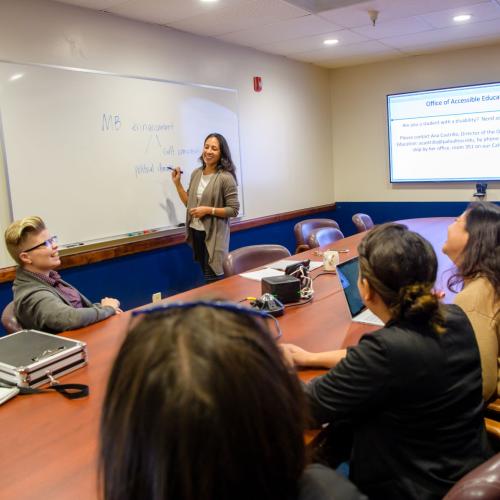
MS in Psychology Curriculum
Program Structure
The MS Psychology program offers several concentrations that require between 37.5 - 47 quarter units of coursework. There is no thesis requirement. Courses are taken over six or seven consecutive quarters (including summer) beginning only in fall quarter.
Students take two or three courses during most quarters. Students in the PhD Prep Concentration are required to travel to Palo Alto for a one-week intensive course in clinical interviewing.
| Units | Quarters | |
| PhD Prep Concentration | 47 | 7 |
| Technology and Mental Health Concentration | 39.5 | 6 |
| Forensic Psychology Concentration | 37.5 | 6 |
| No Concentration (Generalist) | 37.5 | 6 |
With the exception of the summer clinical interviewing course in Palo Alto, the courses are didactic in nature and do not include an applied clinical component. That is why the specific degree associated with the program is an MS in Psychology, not clinical psychology, even though some of the content is relevant to clinical psychology.
The curriculum for this online program is similar to the first year of Palo Alto University's residential PhD program, and many courses are taught by the same faculty members as the on-campus program. This ensures high-quality instruction in both the online and on-campus programs. PAU's institutional data indicate that the performance of students in the online PhD Prep Concentration is comparable to that of students taking the same curriculum on campus.
Students take two or three courses during most quarters. Students in the PhD Prep Concentration are required to travel to Palo Alto for a one-week intensive course in clinical interviewing.
More on AdmissionsSample Schedules
For course descriptions, please see the Palo Alto University Catalog.
PhD Prep 47 units | Tech and Mental Health 39.5 units | Forensic 37.5 units | No Concentration 37.5 units | |
Fall | MTHD509 Research Methods and Statistics I (4)
PSYS501 Child & Adolescent Development (1.5)
PSYS507 Adult Development & Aging (1.5) | MTHD509 Research Methods and Statistics I (4)
PSYS501 Child & Adolescent Development (1.5)
PSYS507 Adult Development & Aging (1.5) | MTHD509 Research Methods and Statistics I (4)
PSYS501 Child & Adolescent Development (1.5)
PSYS507 Adult Development & Aging (1.5) | MTHD509 Research Methods and Statistics I (4)
PSYS501 Child & Adolescent Development (1.5)
PSYS507 Adult Development & Aging (1.5) |
Winter | ASMT500 Psychopathology & Psychodiagnosis I (3)
STAT510 Research Methods and Statistics II (4) | ASMT500 Psychopathology & Psychodiagnosis I (3)
STAT510 Research Methods and Statistics II (4) | ASMT500 Psychopathology & Psychodiagnosis I (3)
STAT510 Research Methods and Statistics II (4) | ASMT500 Psychopathology & Psychodiagnosis I (3)
STAT510 Research Methods and Statistics II (4) |
Spring | STAT511 Research Methods and Statistics III (4)
ASMT501 Psychopathology & Psychodiagnosis II (3) | STAT511 Research Methods and Statistics III (4)
ASMT501 Psychopathology & Psychodiagnosis II (3)
PSYS540 Technology and Mental Health for Children and Adolescents: Screen Time, Digital Interventions, and Teletherapy (1.5) | STAT511 Research Methods and Statistics III (4)
ASMT501 Psychopathology & Psychodiagnosis II (3) | STAT511 Research Methods and Statistics III (4)
ASMT501 Psychopathology & Psychodiagnosis II (3) |
Summer | PSYS511 Social & Personality Psychology (3)
Research Competency Exam | PSYS511 Social & Personality Psychology (3)
PSYS541 Evidence-based Internet Interventions to Reduce Health Disparities (1.5) | PSYS511 Social & Personality Psychology (3) | PSYS511 Social & Personality Psychology (3) |
Fall | CLIN500 Ethics in Clinical Psychology (3)
PSYS500 History & Systems (3) | CLIN500 Ethics in Clinical Psychology (3)
PSYS 543 Mental Health and Design in the Digital World (User Experience) (3) | CLIN500 Ethics in Clinical Psychology (3)
PSYS 520 Introduction to Forensic Psychology (3) | CLIN500 Ethics in Clinical Psychology (3)
PSYS500 History & Systems (3) |
Winter | PSYS502 Cognitive Bases of Behavior (2.5)
PSYS504 Affective Bases of Behavior (2.5)
PSYS 505 Psy Sci II: Biological Bases of Behavior (2.5) | PSYS502 Cognitive Bases of Behavior (2.5)
PSYS504 Affective Bases of Behavior (2.5)
PSYS542 Using Evidence-Based Principles of Multimedia Learning for Product Design (1.5) | PSYS502 Cognitive Bases of Behavior (2.5)
PSYS504 Affective Bases of Behavior (2.5)
PSYS 525 Assessing and Managing Risk (2.5) | PSYS502 Cognitive Bases of Behavior (2.5)
PSYS504 Affective Bases of Behavior (2.5)
PSYS 505 Psy Sci II: Biological Bases of Behavior (2.5) |
Spring Break | CLIN515 Clinical Interviewing. (In-person intensive week.) (3) | |||
Spring | PSYS509 Psychopharmacology (2.5) CLIN508 Introduction of Psychotherapy: Evidence-Based Approaches (3) CLIN 501 Professional Standards I (1) | |||
Summer | Transition to PhD Program Psychometrics Practicum 2A Students are billed the MS per-unit rate for these courses. |
Students in all programs are encouraged to supplement their curriculum with courses from PAU's Continuing and Professional Studies Division. This extensive catalog of on-demand courses is free to students!
Continuing & Professional Studies Forensic Courses Counseling Practice and Essentials
The MS in Psychology program is a part-time, online program. The schedule is planned for students who are working part-time or full-time, with coursework that can be completed during evenings and on weekends.
Learn about our Online Format
Palo Alto University’s Office of Financial Aid offers a variety of financial resources designed to help you with education-related expenses involved in obtaining your educational goal(s). Our financial assistance programs consist of grants, scholarships, loans, and work assistance.
Contact our Counselors Today

